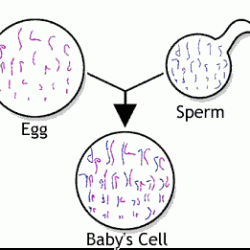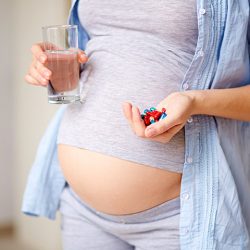University of Florida researchers have identified cells targeted by a male hormone and found that an excess of that hormone at a specific time can cause genital defects in female mice. The findings appear in the Proceedings of the National Academy of Sciences. The study identifies a window of fetal development and a type of cell targeted by masculinizing hormones that … [Read more...]
Fertility & Pregnancy News

Ovarian Transplantation Might Be Possible In Future
Approximately 11% of women worldwide suffer from premature ovarian failure. This can have many different causes: chemotherapy administered for a malignant disease might irreversibly damage the ovaries and, because of the advances in modern cancer therapy, the number of young women surviving cancer is on the increase. The women, some of whom are still very young, prematurely … [Read more...]
Miscarriage, ectopic pregnancy may trigger post-traumatic stress disorder
Women may be at risk of post-traumatic stress disorder following a miscarriage or ectopic pregnancy, suggests a new study. The team behind the research, from Imperial College London, say the findings suggest women should be routinely screened for the condition, and receive specific psychological support following pregnancy loss. In the study, published in the journal … [Read more...]
How human eggs end up with the wrong number of chromosomes
One day before ovulation, human oocytes begin to divide into what will become mature eggs. Ideally, eggs are packaged with a complete set of 23 chromosomes, but the process is prone to error, especially with age. In a Review published October 20 in Trends in Cell Biology, researchers discuss the latest research on why many human oocytes frequently have a wrong number of … [Read more...]
Antibiotics Prior to C-Section Reduce Chances Of Infection
Physicians at the University of Alabama at Birmingham and colleagues have discovered that administering the antibiotic azithromycin alongside the standard recommended antibiotic regimen, cefazolin, reduces infection rates by 50 percent for women who have a non-elective cesarean delivery. A study published in the New England Journal of Medicine shows adding the dose of … [Read more...]
C-section carries increased risk for postpartum venous thromboembolism (VTE)
Women are four times more likely to suffer a VTE after a cesarean-section compared to a vaginal birth, according to a new study in CHEST®. Roughly one-third of all births in Europe and North America now occur via cesarean section (CS). Following any birth, women are at an increased risk for a venous thromboembolism (VTE), but it's believed that CS leaves women more … [Read more...]
Depression in early pregnancy linked to gestational diabetes
Researchers at the National Institutes of Health have discovered a two-way link between depression and gestational diabetes. Women who reported feeling depressed during the first two trimesters of pregnancy were nearly twice as likely to develop gestational diabetes, according to an analysis of pregnancy records. Conversely, a separate analysis found that women who developed … [Read more...]
Breastfeeding Can Help Infants Battle The Risk Of Asthma
Infants who have a genetic profile linked with asthma risk could be protected against respiratory symptoms if they are breastfeed, according to a new study. "Our study is the first to show that breastfeeding can modify the effect of asthma-related genetic profiles on respiratory symptoms in the first year of life," commented Dr Olga Gorlanova, from the University … [Read more...]
Extremely low birth weight babies are 4 times more likely to have abnormal blood glucose
By the time they are in their early 30s, extremely low birth weight (ELBW) babies are four times more likely to develop dysglycemia, or abnormal blood glucose, than their normal birth weight (NBW) peers. These babies who were born weighing less than 2.2 pounds are also more likely than their peer group to have higher body fat and lower lean mass in adulthood, although … [Read more...]
Pain-Reliever Used In Pregnancy May Cause Behavioral Issues In Kids
Using the common pain-relieving medication acetaminophen during pregnancy was associated with increased risk for multiple behavioral problems in children, according to an article published online by JAMA Pediatrics. Acetaminophen is generally considered safe in pregnancy and is used by a many pregnant women for pain and fever. Evie Stergiakouli, Ph.D., of the University … [Read more...]
Vitamin D Levels May Drop When Women Stop Using Birth Control
Women risk having their vitamin D levels fall when they stop using birth control pills or other contraceptives containing estrogen, according to a new study published in the Endocrine Society's Journal of Clinical Endocrinology & Metabolism. Vitamin D is a hormone involved in the immune system and managing calcium levels in the blood. Proper calcium levels are … [Read more...]
Estrogens In Cow’s Milk Does Not Affect Reproductive Health
Estrogen occurs naturally in cow's milk. Recently, there has been concern that consuming milk containing elevated amounts of estrogen could affect blood levels of the hormone in humans, leading to an increased risk of some cancers. A new study published in the Journal of Dairy Science® investigated cow milk's effects on blood hormone levels in adult mice and found that … [Read more...]
New Anti-HIV Medication To Protect Women And Infants
HIV remains a major health concern for women and children globally. Worldwide, the majority of new HIV infections occur in young women. Each year, 1.5 million women living with HIV become pregnant. Without effective treatment, up to 45 percent of HIV-infected mothers will transmit the virus to their child, usually through breastfeeding. In an effort to prevent HIV transmission … [Read more...]
Breast Milk Reduces Infection Risk In Premature Babies
Full-term babies receive natural protection from their mothers that helps them fight off dangerous infections. However, babies born prematurely lack protective intestinal bacteria and often are unable to be nursed, causing their infection-fighting capabilities to be underdeveloped. Now, researchers at the University of Missouri School of Medicine have found that a manufactured … [Read more...]
Thyroid During Pregnancy
A third of pregnant women have iron deficiency, putting them at increased risk of having a thyroid disorder and suffering complications such as miscarriages and preterm births. These are the conclusions of a new study published today in European Journal of Endocrinology. Pregnant women need to make enough thyroid hormone for the full development of their babies' brains, … [Read more...]
Umbilical Cord Benefits
A patch made from cryopreserved human umbilical cord may be a novel method for treating spina bifida in utero, according to researchers at McGovern Medical School at The University of Texas Health Science Center at Houston (UTHealth). The findings were published in Obstetrics & Gynecology, the journal of The American College of Obstetricians and Gynecologists. A … [Read more...]
Obscure Virus Found in Women with Infertility
A new study has found that the little-known member of the human herpesvirus family called HHV-6A infects the lining of the uterus in 43% of women with unexplained infertility but cannot be found in uterine lining of fertile women. The study was conducted by investigators at the University of Ferrara, Italy. The study also found that the response of the immune system to … [Read more...]
The Benefits Of Exercise During Pregnancy
Researchers collected and re-examined clinical trial data on exercise during pregnancy and whether it plays a role in preterm birth, and found that exercise is safe and does not increase the risk of preterm birth. In addition, women who exercised were less likely to have a C-section than those who did not. The study was published in the American Journal of Obstetrics & … [Read more...]
Endometrial Scratch May Help to Conceive
There is a much disputed claim that "injury" to the lining of the uterus -- whether inadvertent or deliberate -- increases the chance of embryo implantation and thus the chance of pregnancy in certain groups of women having IVF. The "injury" has usually been performed as a biopsy from the womb lining (endometrium), whose action is believed to cause a favourable inflammation … [Read more...]
3 in 4 Women Starting Fertility Treatment will have a Baby Within 5 Years
Three in four women starting fertility treatment will have a baby within five years, whether as a result of the treatment or following natural conception. The figures emerged from a large cohort study analysing the birth records of almost 20,000 women having fertility treatment in Denmark between 2007 and 2010. The majority of these women (57%) had their baby as a result of the … [Read more...]
Solo Mothers Raise More Adjusting Children
The number of children born to single women is increasing, partly as a result of social and legislative changes (in most jurisdictions) in the rights to parenthood. While technology has been readily able to meet this rising demand through donor insemination and even IVF, little is known about how children think, feel and fare growing up in the families formed by single … [Read more...]
Prenatal exposure to Acetaminophen may increase Autism chances
A new study has found that paracetamol (acetaminophen), which is used extensively during pregnancy, has a strong association with autism spectrum symptoms in boys and for both genders in relation to attention-related and hyperactivity symptoms. The findings were published this week in the International Journal of Epidemiology. This is the first study of its kind to … [Read more...]
Women from the Caribbean and Africa at highest risk of ICU admission during childbirth
Women born in the Caribbean or Africa are two times more likely to be admitted to an intensive care unit at the time of their delivery than Canadian-born women, a new study has found. The risk for both mom and newborn being admitted to an intensive care unit, or ICU, at the same time was also 2.75 times higher for Caribbean-born women and two times higher for … [Read more...]
Pregnant women’s high-fat diets may affect its offsprings
New research suggests that mothers who eat high-fat, high-sugar diets can predispose multiple generations to metabolic problems, even if their offspring consume healthy diets. While other studies have linked a woman's health in pregnancy to her child's weight later in life, a mouse study at Washington University School of Medicine in St. Louis is the first to … [Read more...]
Stress during pregnancy observed in mothers of children with autism
Stress during pregnancy has been linked to several conditions, including some instances of autism spectrum disorder. Now, researchers at the University of Missouri School of Medicine have observed a variant of a stress-sensitive gene and exposure to stress during pregnancy among two groups of mothers of children with autism. The researchers believe the finding could be a step … [Read more...]
Weight gain between pregnancies is linked to complications and adverse outcomes
Weight gain between pregnancies is linked to pregnancy complications and adverse neonatal outcomes in second born children, according to a study published by Martina Persson and colleagues from the Karolinska Institutet, Stockholm, Sweden, in this week's PLOS Medicine. The researchers examined data from the nationwide Swedish Medical Birth Register, including 532,858 … [Read more...]
Anti-epileptic drug linked to birth defects when taken with other drugs
In an analysis of pregnancies in Australia from 1999 to 2014 in which women were taking anti-epileptic drugs, fetal malformation rates fell over time in pregnancies where only one drug was taken, but rates increased in pregnancies where multiple drugs were taken. The rise in such "polytherapy" malformation rates began around 2005 when levetiracetam and topiramate use began … [Read more...]
Autism with intellectual disability linked to mother’s immune dysfunction during pregnancy: University of California Study
Pregnant women with higher levels of inflammatory cytokines and chemokines, proteins that control communication between cells of the immune system, may be at significantly greater risk of having a child with autism combined with intellectual disability, researchers with the UC Davis MIND Institute have found. The research also suggests a potential immune profile for the … [Read more...]
Prenatal fruit consumption boosts babies’ cognitive development
Most people have heard the old adage "an apple a day keeps the doctor away." It's an old truth that encompasses more than just apples--eating fruit in general is well known to reduce risk for a wide variety of health conditions such as heart disease and stroke. But now a new study is showing the benefits of fruit can begin as early as in the womb. The study, published in … [Read more...]
Inflammation of the placenta interferes with fetal development research suggests
Preeclampsia is one of the most common complications to occur during pregnancy, yet its causes are still unknown. A new study involving patients, cell cultures and animal experiments has now shown that those affected by the disease have lower quantities of the placenta's immune protein CD74, and that certain inflammatory factors are higher. These factors disrupt the formation … [Read more...]
- « Previous Page
- 1
- …
- 3
- 4
- 5
- 6
- 7
- …
- 41
- Next Page »





























